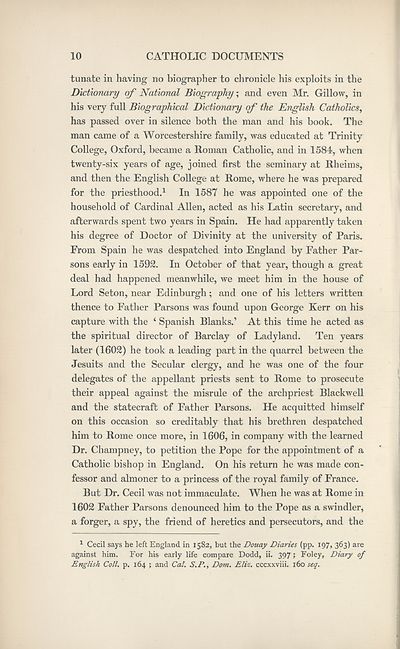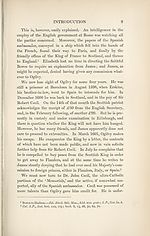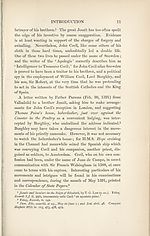Series 1 > Miscellany of the Scottish History Society (First volume)
(103) Page 10
Download files
Complete book:
Individual page:
Thumbnail gallery: Grid view | List view

10
CATHOLIC DOCUMENTS
tunate in having no biographer to chronicle his exploits in the
Dictionary of National Biography; and even Mr. Gillovv, in
his very full Biographical Dictionary of the English Catholics,
has passed over in silence both the man and his book. The
man came of a Worcestershire family, was educated at Trinity
College, Oxford, became a Roman Catholic, and in 1584, when
twenty-six years of age, joined first the seminary at Rheims,
and then the English College at Rome, where he was prepared
for the priesthood.1 In 1587 he was appointed one of the
household of Cardinal Allen, acted as his Latin secretary, and
afterwards spent two years in Spain. He had apparently taken
his degree of Doctor of Divinity at the university of Paris.
From Spain he was despatched into England by Father Par¬
sons early in 1592. In October of that year, though a great
deal had happened meanwhile, we meet him in the house of
Lord Seton, near Edinburgh; and one of his letters written
thence to Father Parsons was found upon George Kerr on his
capture with the ‘ Spanish Blanks.’ At this time he acted as
the spiritual director of Barclay of Ladyland. Ten years
later (1602) he took a leading part in the quarrel between the
Jesuits and the Secular clergy, and he was one of the four
delegates of the appellant priests sent to Rome to prosecute
their appeal against the misrule of the archpriest Blackwell
and the statecraft of Father Parsons. He acquitted himself
on this occasion so creditably that his brethren despatched
him to Rome once more, in 1606, in company with the learned
Dr. Champney, to petition the Pope for the appointment of a
Catholic bishop in England. On his return he was made con¬
fessor and almoner to a princess of the royal family of France.
But Dr. Cecil was not immaculate. When he was at Rome in
1602 Father Parsons denounced him to the Pope as a swindler,
a forger, a spy, the friend of heretics and persecutors, and the
1 Cecil says he left England in 1582, but the Douay Diaries (pp. 197, 363) are
against him. For his early life compare Dodd, ii. 397; Foley, Diary of
English Coll. p. 164 ; and Cal. S.P., Dom. Eliz. cccxxviii. 160 seq.
CATHOLIC DOCUMENTS
tunate in having no biographer to chronicle his exploits in the
Dictionary of National Biography; and even Mr. Gillovv, in
his very full Biographical Dictionary of the English Catholics,
has passed over in silence both the man and his book. The
man came of a Worcestershire family, was educated at Trinity
College, Oxford, became a Roman Catholic, and in 1584, when
twenty-six years of age, joined first the seminary at Rheims,
and then the English College at Rome, where he was prepared
for the priesthood.1 In 1587 he was appointed one of the
household of Cardinal Allen, acted as his Latin secretary, and
afterwards spent two years in Spain. He had apparently taken
his degree of Doctor of Divinity at the university of Paris.
From Spain he was despatched into England by Father Par¬
sons early in 1592. In October of that year, though a great
deal had happened meanwhile, we meet him in the house of
Lord Seton, near Edinburgh; and one of his letters written
thence to Father Parsons was found upon George Kerr on his
capture with the ‘ Spanish Blanks.’ At this time he acted as
the spiritual director of Barclay of Ladyland. Ten years
later (1602) he took a leading part in the quarrel between the
Jesuits and the Secular clergy, and he was one of the four
delegates of the appellant priests sent to Rome to prosecute
their appeal against the misrule of the archpriest Blackwell
and the statecraft of Father Parsons. He acquitted himself
on this occasion so creditably that his brethren despatched
him to Rome once more, in 1606, in company with the learned
Dr. Champney, to petition the Pope for the appointment of a
Catholic bishop in England. On his return he was made con¬
fessor and almoner to a princess of the royal family of France.
But Dr. Cecil was not immaculate. When he was at Rome in
1602 Father Parsons denounced him to the Pope as a swindler,
a forger, a spy, the friend of heretics and persecutors, and the
1 Cecil says he left England in 1582, but the Douay Diaries (pp. 197, 363) are
against him. For his early life compare Dodd, ii. 397; Foley, Diary of
English Coll. p. 164 ; and Cal. S.P., Dom. Eliz. cccxxviii. 160 seq.
Set display mode to:
![]() Universal Viewer |
Universal Viewer | ![]() Mirador |
Large image | Transcription
Mirador |
Large image | Transcription
Images and transcriptions on this page, including medium image downloads, may be used under the Creative Commons Attribution 4.0 International Licence unless otherwise stated. ![]()
| Scottish History Society volumes > Series 1 > Miscellany of the Scottish History Society (First volume) > (103) Page 10 |
|---|
| Permanent URL | https://digital.nls.uk/127082097 |
|---|
| Attribution and copyright: |
|
|---|
| Description | Over 180 volumes, published by the Scottish History Society, containing original sources on Scotland's history and people. With a wide range of subjects, the books collectively cover all periods from the 12th to 20th centuries, and reflect changing trends in Scottish history. Sources are accompanied by scholarly interpretation, references and bibliographies. Volumes are usually published annually, and more digitised volumes will be added as they become available. |
|---|


